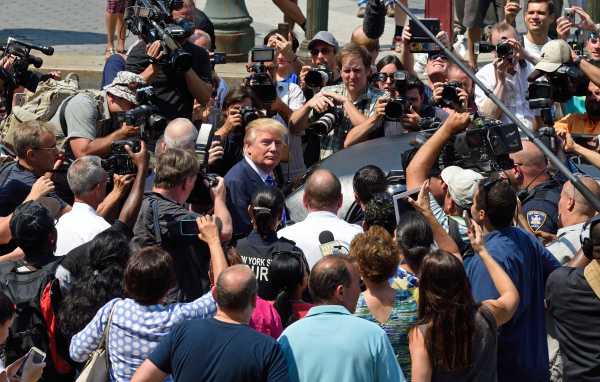
In his classic 1985 book Amusing Ourselves to Death, Neil Postman wrote of the difference between George Orwell’s and Aldous Huxley’s visions of fascism.
“Orwell feared those who would deprive us of information,” wrote Postman. “Huxley feared those who would give us so much that we would be reduced to passivity and egoism. Orwell feared that the truth would be concealed from us. Huxley feared the truth would be drowned in a sea of irrelevance.”
Postman’s warning rang out in a different era. He worried over the rise of television, not Twitter; he was reacting to Ronald Reagan, not Donald Trump. And yet the facts of our age are more absurd and insulting than anything Postman prophesied.
The point of Amusing Ourselves to Death is that societies are molded by the technologies atop which they communicate. Oral cultures teach us to be conversational, typographic cultures teach us to be logical, televised cultures teach us that everything is entertainment. So what is social media culture teaching us?
It can be hard to read Postman today; much of his argument scans as crankiness, and some of the world he describes — writing, as he was, before the dawn of Facebook and Twitter and search engine optimization and autoplay videos — feels like a golden age. This is a manifesto in which Sesame Street, with its mission of making learning fun, serves as a villain because children shouldn’t be taught that education is just another form of entertainment.
And yet the world we live in is both the sort of dystopia Postman feared and worse than anything he dared predict. The president of the United States emerged out of reality television, cable news, and caps-lock tweeting, and his great gift is his ability to own our attention in the precise ways those mediums own our attention — by stoking conflict, deepening grievance, starting fights, and turning everything, absolutely everything, into can’t-look-away entertainment.
What’s newsworthy in an age of entertainment?
A few weeks ago, I was at CNN’s DC bureau to tape Brian Stelter’s Reliable Sources show. This was the day the Environmental Protection Agency’s astonishingly corrupt director, Scott Pruitt, resigned, and Trump named Bill Shine, the Fox News executive ousted for covering up a culture of sexual assault, as a deputy chief of staff. But all around me, the televisions were replaying clips from the previous night’s Trump rally, where he had insulted John McCain, Elizabeth Warren, and George H.W. Bush. There was nothing new in Trump’s mockery — neither his targets nor his language was fresh — but he had wrenched the media’s attention in his direction anyway.
I went on a bit of a rant about this, the clip went viral, and some of my colleagues in the media got defensive. “As if what [the] president says, even repeatedly, isn’t newsworthy?” shot back Paul Farhi, the Washington Post’s media reporter.
But that’s precisely the point: While everything a president says is newsworthy in theory, virtually nothing that most presidents say is newsworthy in practice. President Obama, like Presidents Bush and Clinton before him, put endless time into painstakingly crafted speeches in carefully chosen locales laying out energy policy and tax ideas and defenses of his record. They didn’t get a tenth of the coverage that Trump’s rallies got. Sometimes they got no coverage at all — particularly on cable news, where entertainment value reigns supreme.
To say something is newsworthy isn’t to distinguish it much. The world is full of newsworthy events, comments, reports, facts, people. But the media’s capacity is limited. There are only so many reporters, so much space on the front page, so many minutes in primetime. The competition is fierce, and an almost endless number of important stories are being ignored. What Trump is able to do is crowd many of these stories out — not just the ones that are damaging to him, but also the ones that have nothing to do with him, the stories that speak to bigger and deeper questions in our world.
The media is uncomfortable with the fact that we are constantly deciding what does and doesn’t deserve coverage, and so we duck behind a definition of “newsworthiness” that suggests it is a synonym for “importance.” If we’re just covering the most important story at any given moment then we’re not making choices so much as reflecting existing reality, and who could criticize us for that? But the true definition of newsworthiness is some combination of “shocking” and “entertaining” and “important” — otherwise, we’d just cover deaths from malaria and the warming of the planet all day.
That’s particularly true in the hypercompetitive enclaves of cable news and social media, where only the most attention-grabbing, conflict-rich content thrives. The media has no problem ignoring the president when what he says is boring or predictable. It’s when he’s outrageous or absurd that the “breaking” banners light up. That’s an awful incentive structure, as Trump’s gleeful manipulation of our attention has shown.
And yet, it’s damn hard to resist. It’s damn hard to resist because Trump’s behavior really is so outlandish, and because if everyone else is covering Trump’s latest comments you feel like you’re missing the story if you focus elsewhere, and because there really is audience demand, and because Trump rallies make for damn good TV segments and Facebook posts. And I say this as someone whose coverage is just as driven by these incentives as anyone else’s.
Trump knows all this, he is a genius at understanding the dynamics of press coverage, and it’s allowed him to hack the media brilliantly, to even make critical coverage part of his strategy and storyline. He controls our attention more effectively than any president in memory, perhaps than any president in history. But at what cost?
We normalized the media that normalized Donald Trump
Since Trump was elected, the bookshelves and op-ed pages have been alive with fears of Orwellian fascism — fears that, for the most part, remain far from manifesting. But even as Orwell’s dystopia has failed to materialize, Huxley’s dystopia has: We are buried under ignorance disguised as information, confused by entertainment masquerading as news, distracted by a dizzying procession of lies and outrages and ginned-up controversies, inured to misbehavior and corruption that would’ve consumed past administrations. We have lost control of our attention, if not of our government.
It is hard to read this paragraph from Postman without feeling he is speaking specifically about us:
The chaotic swirl of information, anger, conflict, identity, performance, and trivia that characterizes Trump’s governance also characterizes the mediums that created him. For all the talk of normalizing Trump, it was our normalization of the platforms he thrived on — reality television, cable news, and Twitter — that made Trump possible. Could Trump have won the Republican primary and the presidency in the days before he could call into cable news shows at will, get his rallies carried live on television, drive media coverage from the comfort of his Twitter account? Could he have won if we hadn’t come to see our politicians as entertainers, to believe conflict the true story of governance, to connect the quantity of media coverage with the quality of candidates? I doubt it.
“To be unaware that a technology comes equipped with a program for social change, to maintain that technology is neutral, to make the assumption that technology is always a friend to culture is, at this late hour, stupidity plain and simple,” Postman warned.
We have been, to our credit, alert to the dangers of Orwellian tyranny. We have been much less vigilant against the threat of Huxleyan distraction. Trump manages the government clumsily, but he controls public attention masterfully. He is showing, daily, how the truth can be drowned under a sea of irrelevance, how easily the defense of the indefensible can go down if it is cast as entertainment.
The politicians who follow him will learn his lessons. Will the rest of us?
Sourse: vox.com






